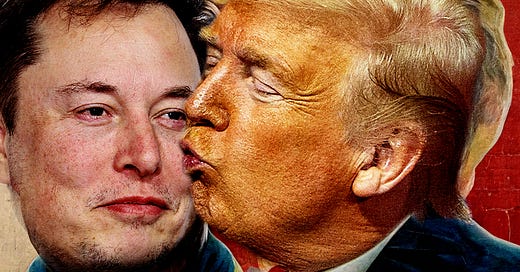Before we start: The conversation about organic chemistry yesterday was a little larger and louder than I’d expected. And some lots of you thought I was 180 degrees wrong.
But the comments were so good! Thank you, again, for making this community productive, engaging, and just . . . full of goodness. I don’t know how else to put it.
Thank you.
Also: The second episode of the fully-public, YouTube version of The Next Level is up and it’s pretty great! You should watch it for (1) My heel turn at 0:53 and (2) My report from the future at 48:52.
Just like last week, I’d be grateful if you’d subscribe to the YouTube channel, even if you’re never going to watch the show there. And if you are going to watch it on YouTube, hit the Thumbs Up button. It helps so much it’s stupid.
1. Elon Doesn’t Like Discovery
A bunch of Elon Musk’s texts became public as part of discovery and suddenly Rocket Man is all, “Yeah. Sure. $54.20 a share. Let’s do this thing.”
It was . . . embarrassing. For instance, Larry Ellison texted his Good Friend Elon to ask about investing in the Twitter takeover. Here’s what Musk said:
Musk: Roughly what dollar size? Not holding you to anything, but the deal is oversubscribed, so I have to reduce or kick out some participants.
Spoiler: The deal was not “oversubscribed.” In fact, there was then and remains now a big, gaping hole in the financing.
As Charlie Warzel noted, the Musk texts obliterate the idea that these people are special geniuses.
In winner-take-all markets—tech is one of these, more or less—you get a thousand people all trying to sell umbrellas in the rain. One of them is going to sell the most umbrellas. Sometimes, it will be because they made a better umbrella. But most of the time it will be dumb luck. For instance, the rain started earlier in their part of town. Or the corner they were standing on had more foot traffic that day.
Most of the time—not all, but most—this doesn’t make the winner a genius and the losers dummies.
Charlie Sykes talked about this on his show yesterday with Kara Swisher and you should listen to it now if you haven’t. It’s so good.
Anyway . . .
I do not think we should all assume, 100 percent, that the deal is now actually going to close. Here’s Ben Thompson:
This does not mean the deal is closed. At this point Musk doesn’t deserve any benefit of the doubt; it’s perfectly reasonable to wonder if he trying to run out the clock on financing for example. That noted, Musk did tweet that Twitter would play a role in his “X everything app” vision, so perhaps he is moving forward.
The most obvious explanation as to why Musk is apparently giving up on his attempt to get out of the deal is that he was losing in court continuously; at least now he could potentially save on legal fees. . . .
Just before the letter was released the Court said that Twitter could investigate whether or not Twitter whistleblower Mudge contacted Musk before Musk tried to pull out of the deal.
This third point is especially interesting, since the timing of the Twitter whistleblower was quite coincidental.
All of which is to say that the market now believes that the deal will close. At 12:05pm yesterday, Twitter was trading at $42.95. At 3:50pm, it was at $51.78.
But as for me, personally, I’m not at 100 percent.
This is a great case of Everybody Loses.
Twitter did not want to be bought by Elon Musk.
Elon Musk did not want to buy Twitter.
I suspect that over the last six months, a lot of Musk’s financing subs began to hope that they would not have to be party to the purchase.
There are only two winners.
Winner #1: The rule of law. Laws still mean something. The Delaware Chancery Court was clearly going to enforce the law, no matter how much the litigants did not want it. Even though it would be unpopular. Even though there was no real constituency, in this case, for the law.
So score one for the law. Sort of. Because Winner #2 is





